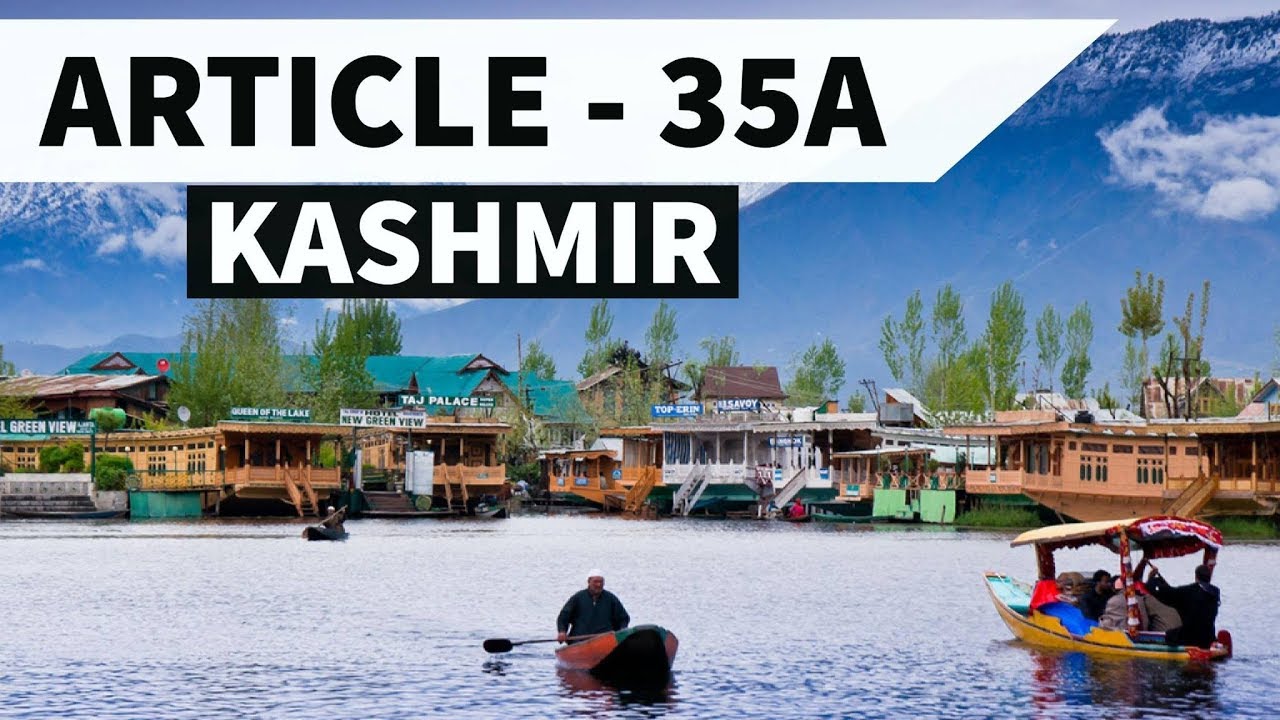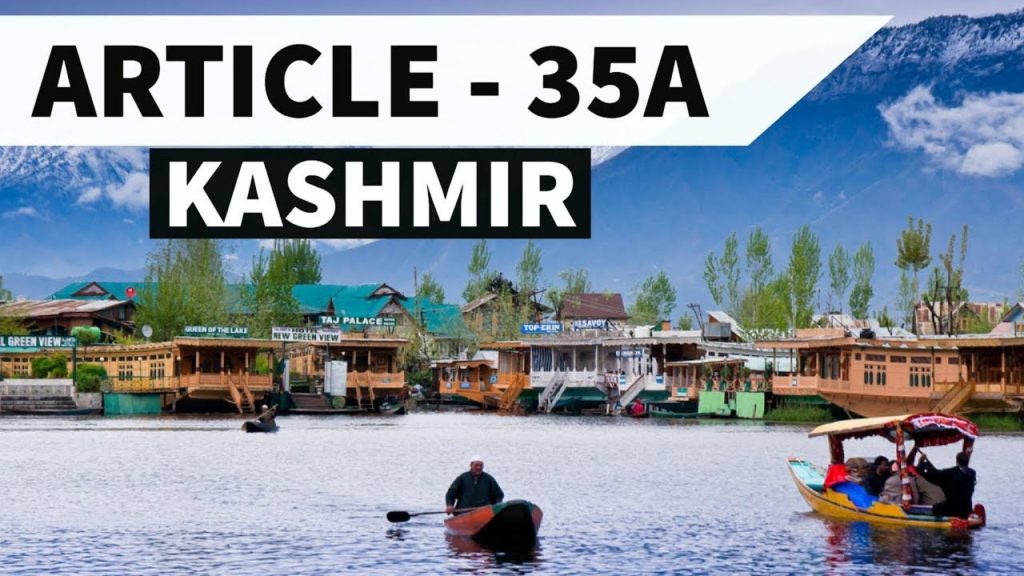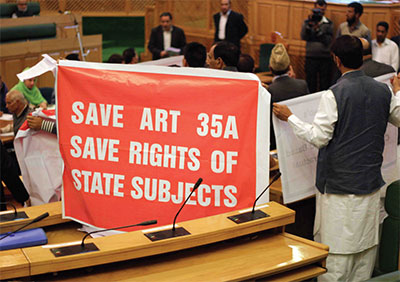
The clamour having died down, now is a good time to logically dissect the article, separating rhetoric from reason and focussing on the rights issue that lies at its centre.
Co-Written By Sheikh Attar and Palvi Singh Ghonkrokta
In 2015, the constitutional validity of Article 35(A) was challenged, with a petition filed in the Supreme Court by the Jammu and Kas hmir Study Centre (JKSC), an RSS affiliated think tank. Recently, a documentary screening on the Article was held by the same organisation aimed purportedly at highlighting its discriminatory impact on some of the resident groups in the state besides pitching for the plight of Kashmiri women in general.
The documentary did address longstanding grievances – of the hapless West Pakistan refugees, who form a major chunk of the people in question, along with the few thousand Safaikaramcharis of Valmiki basti whose services were sought from neighbouring Punjab in 1957and the Gurkha residents who have fought wars for Kashmir under the erstwhile Rajas of Kashmir.
It is true that extending a permanent resident status to the above three categories is a matter that has been politically dodged and kept in abeyance for too long and calls for urgent resolution by the state government. However, given the gravity of the situation one hoped that rather than appeal to plebeian passions the documentary would make reasoned arguments. To that effect, it was not just inadequate but plainly speaking lacking in legal wisdom and political prudence.
ARTICLE 35 (A): AMENDMENT RATHER THAN ABROGATION
Article 35(A) per se is a bone of contention for two reasons. One the manner in which it was added to the Indian Constitution via The Presidential Order of 1954, bypassing the prescribed parliamentary procedure, hence the call for its unconstitutionality and second for its discriminatory results on the people mentioned above.
While the first question is for the court to decide, with a petition pending, the fallacy about the role of Article 35(A) with regard to the inclusion of WPRs and the status of Kashmiri women needs to be set right.
Essentially Article 35(A) provides immunity from legal challenge to any law of the state that confers permanent residents with special rights and privileges. What is equally true, is that it is perfectly within the State legislature’s law making power to amend the definition of who constitutes a ‘permanent resident’
In fact Section 8 of the J&K Constitution clearly states:
“Nothing in the foregoing provisions of this part shall derogate from the power of the State Legislature to make any law defining the classes of persons who are, or shall be, permanent residents of the State”.
The language of the section shows that a narrow connotation was deliberately avoided. ‘Or shall be’ implies a wider ambit and that future additions were explicitly contemplated. Further ‘Nothing in the foregoing provisions’ covers Section 6 that defines ‘permanent residents’, setting aside all doubts that altering the definition of permanent residents is well within the state government’s purview.
In light of this existing amendment provision in law, advocating the complete obliteration of a constitutional article with so much gusto, raises doubts. For one, it makes one’s intent suspect. Many see it as a deliberate undermining of the border state’s special status and an attempt by the Indian government to intrude upon the autonomy of the state.
All the same there is an immediate need to address the situation of refugees in the state. Piecemeal efforts like the Identity certificates may help secure central government jobs but land ownership is still a point of discord. While fears of change in demographics are unfounded, given that the total number of refugees is merely over a lakh – granting state citizenship to them is undoubtedly bitterly contested by parties, including separatists.
Such a move then, is likely to add to the extant socio-political upheaval, marring Kashmir along strict political divisions but there is a need to rise above the political sphere and view them from a humanistic prism. Politics alone cannot be allowed to take precedence over humanity.
A more palatable proposition would be to follow the Chakma example of conditional citizenship with a proviso. This would heal old wounds without opening new ones and would effectively side step the emotive land issue.
Speaking of land laws, it is worth noting that several states prohibit or come with riders attached for land ownership to ‘outsiders’. Himachal Pradesh for instance does not allow non-himachalis to purchase agricultural land. Again Arunachal Pradesh, Mizoram, Nagaland etc disallow land ownership to non-residents.
At the risk of drawing parallels, like them, Jammu and Kashmir too has long fiercely guarded the rights of its citizens, as is evident from the 1927 State subject Notification, that pre-dates the state’s accession and from which the rights being challenged today ensue. Equally while this position withstands scrutiny vis-à-vis the rest of Indian citizens, mulling over the status of the state’s refugees is well warranted.
THE CONFUSION REGARDING THE RIGHTS OF WOMEN
The documentary also made an impassioned plea on behalf of the Kashmiri women claiming the article discriminates against their children, depriving them of the permanent resident (PR) status, should their mother choose to marry a non-Kashmiri man or ‘outsider’, thus striking at the very roots of Articles’ 14, 15, 16 and 21.
In fact a Supreme Court lawyer went on to say, that post the 2002 judgement (referring to the Susheela Sawhney case) though Kashmiri women marrying outsiders would retain their PR status with its concomitant rights and benefits – the same would not extend to their children and on their demise, the immovable property held by them would be escheated back to the State.
Not only was this factually inaccurate but in fact a misleading statement. In State of Jammu and Kashmir v.Susheela Sawhney, the question pertained to whether a Kashmiri woman on marriage to an outsider forfeits her PR status and the right to hold immovable property? This involved a reading of the 1927 notification that defines a ‘state subject’ and forms the basis of the definition of a permanent resident.
The court in its judgement, cleared the air by upholding the rights of Kashmiri women, regardless of their marital status, saying Note III of the 1927 Notification that was being relied on, did not in fact apply to women who were permanent residents by birth at all.
More importantly, while the question of their children was not raised, it affirmed inter alia that the descendants of state subjects, by virtue of Note II, whether male or female, would retain their PR status regardless of their marriage to a non-state subject. This effectively renders the ‘equality argument’ null and void.
However despite the judicial pronouncement statutory confusion prevails primarily because the State parliament has not amended the law to this effect. In early 2017 a committee was set up on Governor N N Vohra’s suggestion to look into the matter, though it goes without saying that it would serve the state government well to make the due legal revisions, thereby dispelling unnecessary fears in this regard.
As the clamour for doing away with the Article is growing stronger, the onus of action is clearly on the State government and not just because legally the ball is in its court. The ruling BJP at the Centre, despite being an alliance partner in the state with the PDP, chose to favour a debate over the Article rather than lay it ghost to rest, against all political expediency. Twice before the country’s top court has touched upon the subject but the present petition is seen as decisive in that the judgement will have several ramifications, the least of all on the two unlikely allies.
Sheikh Attar and Palvi Singh ghonkrokta are freelance writers and can be reached at [email protected] and [email protected]..












































